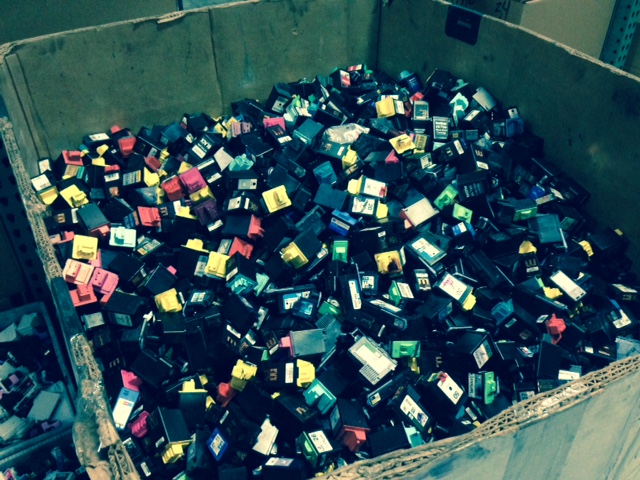 UAB employees can now recycle used toner and ink cartridges by dropping them in Campus Mail. The new program aims to make recycling as easy as possible for employees, and, in return, UAB will receive a check for the recycled cartridges.
UAB employees can now recycle used toner and ink cartridges by dropping them in Campus Mail. The new program aims to make recycling as easy as possible for employees, and, in return, UAB will receive a check for the recycled cartridges.
“I think that working smarter is always better, and that’s part of the reason why Campus Mail was such an obvious choice,” said Paula Mitchell, director of Print and Mail. “Employees don’t have to worry about where to put the cartridges, they just put them with their outgoing mail and we’ll take care of it.”
Several departments partnered to create the program, including Business and Auxiliary Services’ Shipping and Receiving and Print and Mail, Financial Affairs’ Surplus Warehouse, UAB Sustainability and PCR America. Belinda Mitchell, director of University Purchasing and founding member of the UAB Sustainability Committee, created the bid package and contract for the toner-recycling program.
|
Additional Sustainability Measures Campus Print and Mail recycles the large aluminum plates used for printing, recycles all waste paper and cardboard, uses low-hazard inks and cleans and reuse the cloths used to keep the printers oiled instead of using disposable cloths. Shipping and Receiving recycles pallets and cardboard and hosts the Alabama Environmental Council’s (AEC) glass dumpster as a partnership between UAB and AEC. The Surplus Warehouse recycles all surplus computer equipment through a contracted electronics-recycling vendor. |
Since the program started, Paula Mitchell said they’ve seen a good amount of participation. She said they even get emails from customers letting the department know when they have a big pickup.
Those who want to participate should place used toner or ink cartridges in the box for the new cartridge — or the old box, if they saved it — and put it into the Campus Mail as if it were outgoing mail. Campus Mail will take these items to Shipping and Receiving. When there is a full shipment, the cartridges will be sent to PCR America, which will refill the cartridges for sale as remanufactured cartridges.
“This is a way to keep them out of the landfills,” said Wayne Stead, director of business development for PCR America.
Ink cartridges can only be remanufactured for use up to three times and toner cartridges up to five times. Once the cartridge has exhausted its reusability, it then will be turned into other sustainable products. Stead said the plastic from those that can no longer be remanufactured will be broken down into pellets to be turned into plastic materials that have nothing to do with ink or toner.
“Ultimately, we are preventing all of these cartridges from going to the landfill,” Stead said.
Steve Murray, director of Business and Auxiliary Services, said it’s important for UAB to commit to recycling ink and toner cartridges because of their effect on landfills. Cartridges can take 500-1,000 years to decompose in a landfill and may leak printer ink into the environment.
Business and Auxiliary Services will use the money received from recycling the cartridges to fund future sustainability projects.
Note: Hospital locations must follow a different procedure. Staples, Inc., will pick up spent toner cartridges in hospital areas. Cartridges should be placed back into a box (generally the one that the new cartridge came in.) When Staples makes their routine deliveries to your department, they will pick up any used cartridges and take them with them. Please do not leave cartridges by the mailboxes in our public areas, but rather give them to the delivery staff when they are in your area.